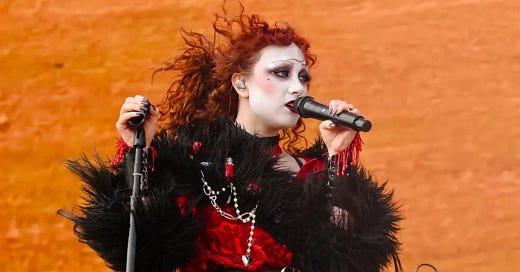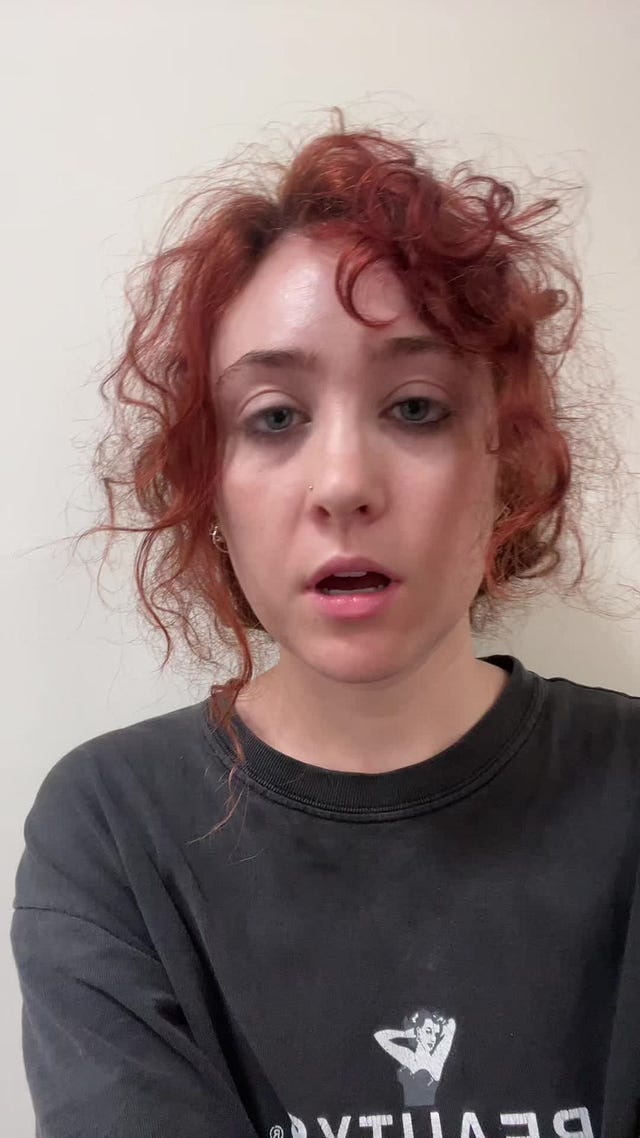“I’ve grinded away my entire life to smile for everyone to be the perfect child, or the perfect daughter, or the perfect actor. Part of me wanted to be the mess they cleaned up off the floor.” — Where Are You, Echo Blue?
This quote from my book, Where Are You Echo Blue? made me think of what Chappell Roan said when she took to TikTok this week to discuss the harassment, stalking and “creepy behavior” from superfans of hers.
Here’s what she said:
“If you saw a random woman on the street, would you yell at her from your car window? Would you harass her in public? Would you be offended if she says no to your time because she has her own time? Would you stalk her family? Would you follow her around? Would you try to dissect her life and bully her online?... I don’t care that this crazy type of behavior comes along with the job, the career field I’ve chosen. That does not make it OK. That doesn’t mean that I want it, that doesn’t mean that I like it… I don’t want whatever the fuck you think you’re supposed to be entitled to whenever you see a celebrity. I don’t give a fuck if you think it’s selfish of me to say no for a photo or for your time or for a hug… It’s weird how people think that you know a person just because you see them online and you listen to the art they make. That’s fucking weird! I’m allowed to say no to creepy behavior, OK?”
And she is allowed to say no to this behavior! I hate this whole idea that celebrities have it coming, or this is what they signed up for when they became famous. That they can’t have it both ways - call the paparazzi and also hate the paparazzi. Why can’t you want people to treat you like a human being?
I was a celebrity journalist for a very short time. And the reason it was such a short time was because I was utterly creeped out by the behavior of fans. It was one of the reasons I was inspired to write ECHO BLUE. I wondered about my own behavior, asking personal questions, wanting to know more from my subject, writing abotu them as if they were an object. Yes, I know that celebrities want to be covered in national newspapers like the New York Times and E! and all of the other places that cover them. They want to sell their product. But does it mean they have to sell themselves too?
Once, I wrote about Celine Dion for the New York Times. It was a fan event so I knew the fans would be there. But the moment I saw thousands of people crowding Celine Dion, I became afraid for her. She had security yes, but what did it mean to have so many people pulling at her, hysterically crying for her? For people to be screaming her name? She was at an event, not on the street, so it wasn’t as if she was being attacked in a way that was unplanned. But still, I had a hard time wrapping my brain around it.
And it leads me back to Chappell Roan. Evan Ross Katz wrote about her situation in his newsletter today:
More specifically he asked:
So what’s the solution? Let’s dig deeper on the problem and see if we can suss out a better path forward — not just for Roan, but to disassemble the growing toxicity of the parasocial relationship between celebrity and fan, one often cultivated by mega-celebrities.
And there should be a solution! Because if you love celebrities like I do, then don’t you also have to give them space? Don’t you have to treat them like human beings? Shouldn’t they expect that of their fans. Look, I also understand that young adults can’t hold it together when they see someone they love. My daughter and one of her best friends saw Kevin Chamberlin, aka, Bertram from Jessie. He was staying at a hotel we were staying at in Asbury Park. My daughter was freaking out. I mean, practically crying. She couldn’t hold it together. Oh my god there’s Bertram. Right there in front of me!! He couldn’t have been nicer. He asked us to let him get a shirt on (we were at the pool) and dry off, then he would pose for a photo. We spoke to him kindly and gently. He told us about a new tv show he was going to be in. He told us how many followers he had on TikTok. I took a picture and we went on our merry way.
It’s clear that some famous people are just not cut out for fame. (And no I’m not talking about Ben Affleck because you don’t marry one of the most famous women in the world and decide the day after you marry her, on your freaking Honeymoon, that you actually can’t take the fame. But that’s a whooole other story that I’m committed to talking about as long as ya’ll want me to.)
There are famous people who really love fame and appreciate their fame and can handle the madness. Going back to Celine Dion. She’s one of them. She’s been doing this long enough to sincerely appreciate her fans and love the attention. Granted, Celine Dion didn’t grow up int he age of social media. She was a young French singer long before social media came up.
I remember when Eddie Vedder and Pearl Jam were getting famous really fast and Eddie’s fans got super personal with him super quick. I was one of those people. I wrote a few fan letters to Eddie Vedder back in the day because I really thought he was going to read them. The letters weren’t just fan letters, to me the letters were deeply personal about how I believed he and I could relate because of the music he created. That’s what happens when you are touched by someone so deeply. You think you know them.
It’s how I created Goldie Klein, the obsessive journalist who is chasing Echo Blue. Goldie is convinced that she and Echo are friends. That if Echo just knew her, she would be able to get close to her. This is the kind of dangerous parasocial relationship Chappell Roan is talking about.
Look, there’s nothing wrong with a celebrity setting up a boundary. They have to, don’t they? They have to be able to say to their fans, I don’t want this. And hopefully the fans will listen. The ones who don’t—those are the ones she has to worry about.
—Hayley







Oh my god I wrote Celine Dion was French. I mean French Canadian. I’m so embarrassed!!!